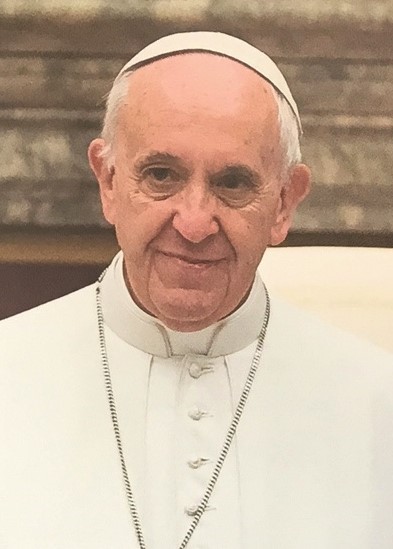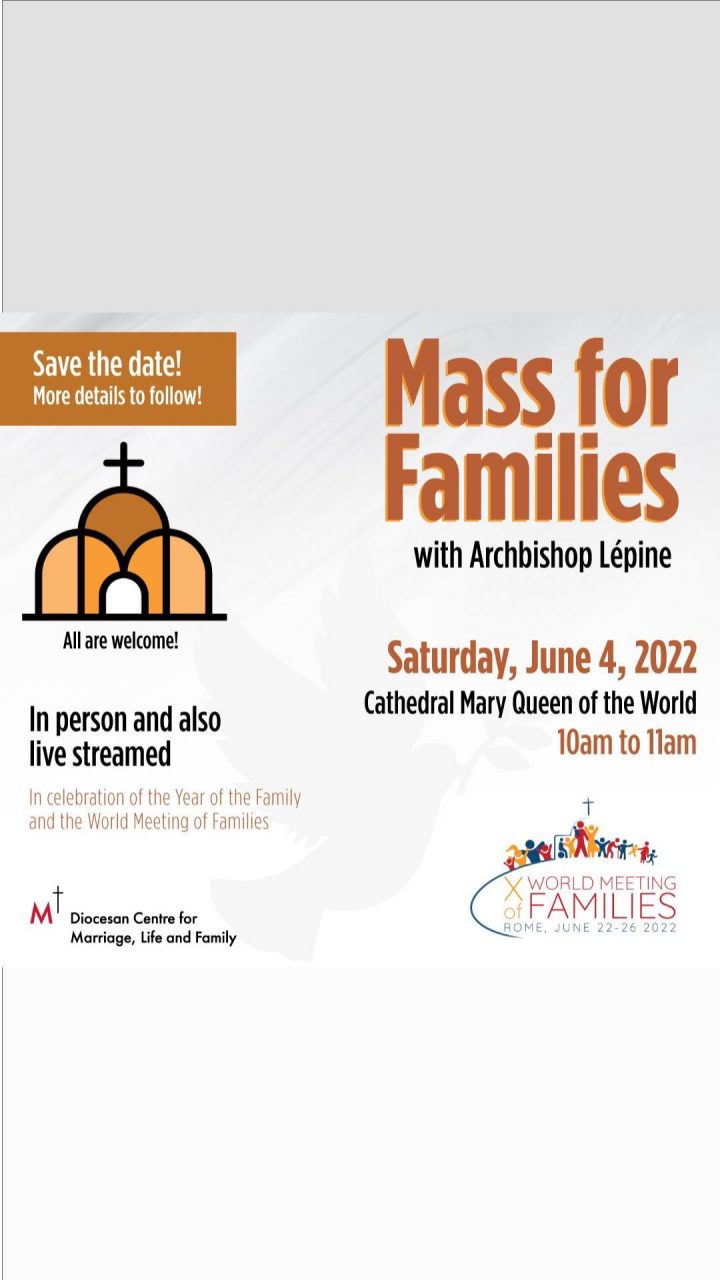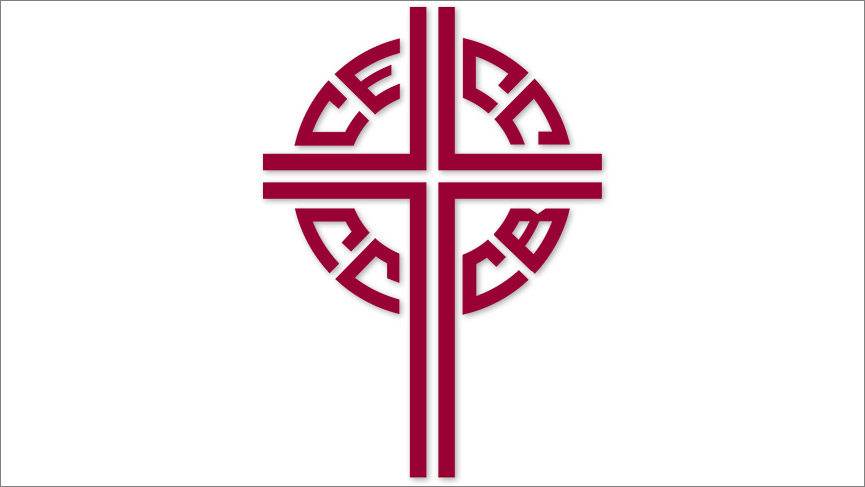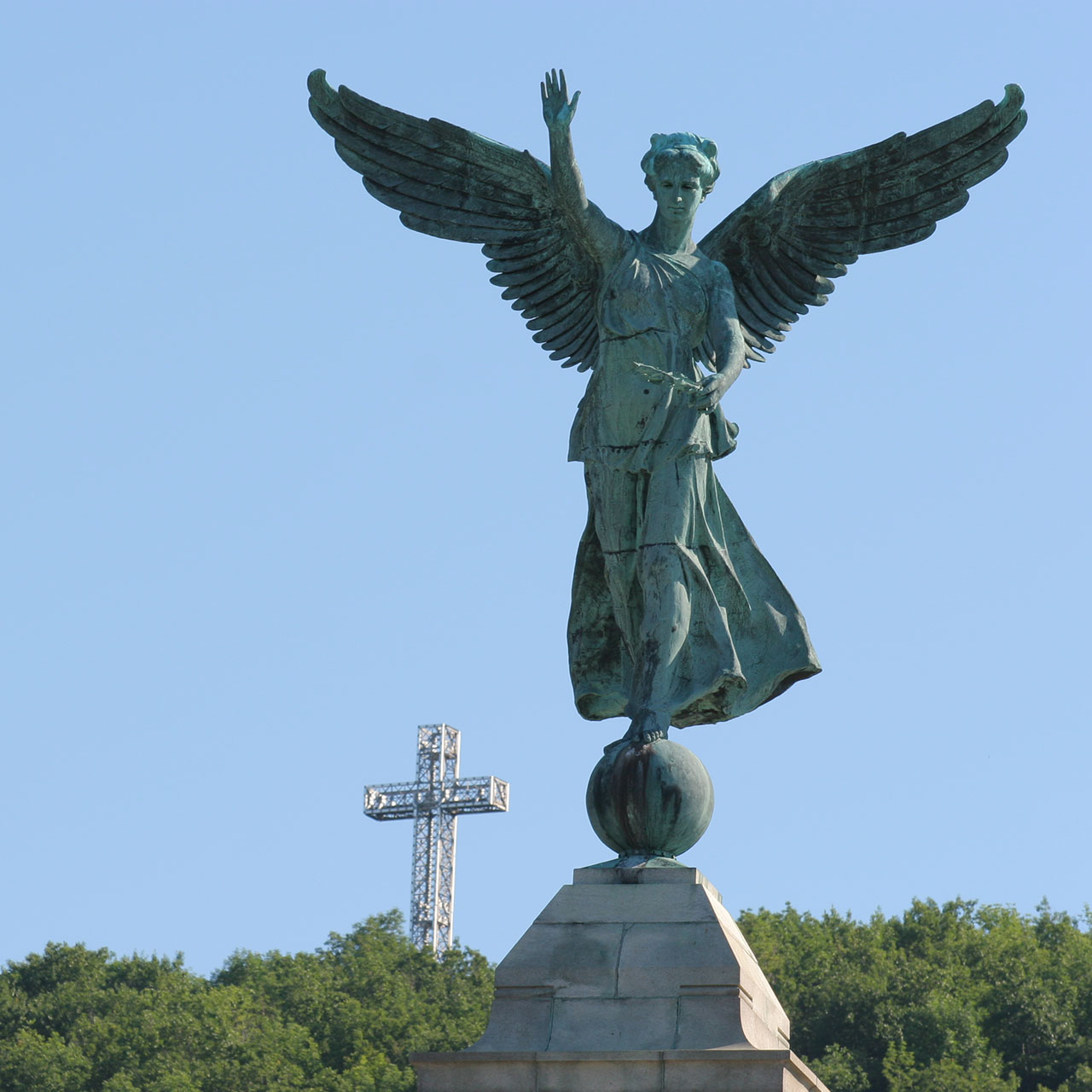June 19, 2022
Pope Francis in Canada from July 24 to 29
Pope Francis will make a pastoral visit to Canada from July 24 to 29, 2022. The Pope’s visit will provide an opportunity for him to listen and dialogue with Indigenous Peoples, to express his heartfelt closeness and to address the impact of residential schools in Canada. The papal visit will also provide an opportunity for the shepherd of the world’s 1.2 billion Catholics to connect with the Catholic community in Canada.
Given the vast landscape of our country, the limited time period for the visit and considering the health of the 85 year-old Pontiff, the Vatican has announced that Pope Francis will adopt three communities as a base for his Canadian visit: Edmonton, Quebec City, and Iqaluit. The locations will limit travel for the Holy Father while still allowing an opportunity for both intimate and public encounters, drawing on participation from all regions of the country.
Specific programming and events will be confirmed approximately six weeks prior to the Holy Father’s arrival.
Visit www.papalvisit.ca or www.visitepapale.ca for more information and to stay updated on the latest developments.
Please continue to pray for the health of Pope Francis.
MAY 8, 2022
Mass for Families to be Celebrated by Archbishop Lépine
The 10th World Meeting of Families, to be held in June 2022 in Rome, will mark the conclusion of this special year. In the same spirit, the Archbishop will take the occasion of the above-mentioned Mass to entrust with a mission those families who are to represent our diocese during their sojourn in Rome from June 20-27, 2022. For further details, please visit Upcoming Activities (diocesemontreal.org).
The Pope also desires that the World Meeting of Families should be celebrated outside Rome as well! Dioceses and eparchies from all over the world are invited to join in the event. The Dicastery of the Laity, Family and Life, which coordinated the World Meeting of Families, has prepared a pastoral kit containing tools to help inspire each diocese/parish to adapt the initiatives to their own local cultural contexts and their own pastoral needs.
We look forward to welcoming as many of you as possible at this Mass
Saturday June 4, 2022
Cathedral Mary Queen of the World
10am to 11am
April 2, 2022
Catholic Bishops of Canada welcome Pope Francis’ apology to indigenous peoples.
Ottawa, April 1, 2022 —
Today marks the conclusion of the Indigenous delegation to the Holy See, culminating with an historic apology from Pope Francis for the Catholic Church’s role in Canada’s residential school system.
The Holy Father expressed “sorrow and shame” for the abuse and lack of respect for Indigenous identities, culture and spiritual values in the residential school system. He said, “I ask for God’s forgiveness and I want to say to you with all my heart: I am very sorry. And I join my brothers, the Canadian bishops, in asking your pardon.”
“We are deeply grateful to each of the Indigenous delegates who travelled with us to the Holy See to share their experiences and desires for a brighter future for their people,” said Canadian Conference of Catholic Bishops (CCCB) President, the Most Rev. Raymond Poisson. “The Holy Father has heard first-hand the stories of those who suffered at the hands of Catholic Church members, and has responded with compassion, remorse, and a genuine desire for truth, justice, and healing.”
The Holy Father’s apology was informed by private encounters between March 28th and April 1st with 32 Indigenous Elders, knowledge keepers, residential school survivors and youth from across Canada.
Delegates shared a range of lived experiences including from their time in residential schools, the resulting loss of culture and language, and complex relationships with the Catholic faith that continue to this day. Through shared prayers, the exchange of gifts and the telling of powerful stories, Pope Francis was moved by their courage, their commitment and their resilience in the face of suffering. He emphasized his shame for the Catholic Church’s role in the residential school system, and re-committed to visiting with them on Canadian soil.
The delegation follows more than three years of dialogue between Canada’s Catholic Bishops and Indigenous partners, including the Assembly of First Nations (AFN), the Métis National Council (MNC), and the Inuit Tapiriit Kanatami (ITK), with a goal of learning and discerning how best to support them on the journey of healing and reconciliation. As this dialogue is ongoing, we have taken several important steps to support a more hopeful future, including a $30 million pledge towards healing and reconciliation initiatives, a commitment to ensure residential school documents are made available to survivors, and ongoing work to provide education for our clergy, consecrated men and women, and lay faithful, on Indigenous cultures and spirituality.
“As Catholics, we believe in the restorative power of apologies. But acknowledging wrongdoing is only one step of the healing journey. We all have a role to play in healing the wound that was opened up through a history of colonialism and must be deeply committed to this responsibility,” said CCCB Vice President, the Most Rev. William McGrattan. “As we prepare for the Holy Father’s eventual pilgrimage to Canada, the relationships forged this week and the lessons learned from Indigenous delegates will continue to guide and inspire us.”
We heard a call from Dr. Wilton Littlechild to walk where there’s no path and create a new one for people to follow. Every delegate who courageously spoke to their experiences has taken up this call, and we are grateful that Pope Francis responded in kind. We look forward to walking on this path together.
MARCH 20, 2022
Catholic Bishops of Canada invite all Canadian faithful to join Pope Francis and to pray for peace.
Ottawa, March 17, 2022 —
On Friday, 25 March 2022, Pope Francis will consecrate Russia and Ukraine to the Immaculate Heart of Mary during the Celebration of Penance that he will preside over at 5:00 pm (Rome time), in St Peter’s Basilica.
Pope Francis wishes to place the people of Ukraine and Russia under the protection of Mary, the Mother of God, with a special liturgical act. To this end, he will consecrate the two countries to the Immaculate Heart of Mary at a penitential celebration. This act has been well received by the Catholic Bishops in Ukraine as well as by the Russian Bishops.
In response to Pope Francis’ decision to consecrate both Ukraine and Russia to the Immaculate Heart of Mary, the Ukrainian Catholic leaders will prepare with a novena that will start on 17 March 2022. They hope that all Catholic faithful from around the world will join them.
In view of this appeal, the Catholic Bishops of Canada, united with the Holy Father, invite their faithful and all people of good will to participate in the novena with the following prayer:
God of реасе and justice,
we pray for the реорlе of Ukraine today.
We pray for реaсе and the laying down of weapons.
We pray for all those who fear for tomorrow,
that your Spirit of comfort would draw near to them.
We pray for those with power over war or реасе,
for wisdom, discernment and compassion to guide their decisions.
Above аll, we pray for аll your precious children, at-risk and in fear,
that you would hold and protect them.
We pray in the name of Jesus, the Prince of Реасе.
Amen.
In coordination with all the parishes/churches of the Ukrainian Catholic Eparchy of Edmonton, the Roman Catholic Diocese of Calgary, the Anglican Diocese of Calgary, the Catholic Archdiocese of Edmonton, the Anglican Diocese of Edmonton, the Anglican Diocese of Athabasca, the Roman Catholic Diocese of St. Paul, the Evangelical Lutheran Church in Canada, and the Ukrainian Orthodox Church of Canada, a Day of Prayer for Peace in Ukraine will be observed on Friday, 18 March 2022. For this purpose, a special Liturgy of the Word has been prepared.
Other similar initiatives are encouraged and welcomed.
MARCH 13, 2022
Quebec Catholic Bishops Appeal for Solidarity with the People Affected by the War in Ukraine.
Nicolet, March 10, 2022 – Convened in plenary, the Catholic bishops of Quebec express their shock and sadness at the war that is currently ravaging Ukraine. They appeal to all Quebeckers, especially Christian communities, to demonstrate their solidarity with the people affected by the war in Ukraine.
First of all, the bishops encourage the offering of prayers for peace and for the people who are suffering in this armed conflict. With this in mind, they welcome the initiatives of prayer and spiritual solidarity begun by parishes and dioceses throughout Quebec. The daily prayers of every person may include the fate of the suffering peoples of Ukraine and Russia.
The bishops also invite Christian communities to assist, as well as initiate, measures to receive the people who have begun to arrive in Quebec seeking refuge and reassurance. The Catholic Church in Quebec has a long tradition of providing hospitality, especially in crisis situations. The present moment calls us to carry on that tradition in conjunction with organizations dedicated to assisting refugees.
Finally, the bishops encourage the citizens of Quebec to give generously to organizations that provide assistance directly to people displaced and affected by the war. Those wishing to contribute to this effort may contact Catholic humanitarian aid organizations, such as Development and Peace (Caritas Canada), which has set up an emergency campaign for Ukraine; the Catholic Near East Welfare Association (CNEWA), which is a papal agency active in Eastern Europe; and Aid to the Church in Need, which assists local churches. In this spirit, the Secretariat of Catholic Bishops of Quebec has pledged a donation of $10,000.
Let us be peacemakers!
FEBRUARY 6, 2022
Letter of the Catholic Bishops of Québec to their Sisters and Brothers on the Occasion of the Reopening of places of Worship on February 7 2022.
The resumption of our activities is an opportunity to recall the duty of the State to respect, promote and protect religious freedom. The Declaration on Religious Freedom made during the Second Vatican Council is very clear on this subject. We make this conviction our own:
The protection and promotion of the inviolable rights of man ranks among the essential duties of government. Therefore government is to assume the safeguard of the religious freedom of all its citizens, in an effective manner, by just laws and by other appropriate means. Government is also to help create conditions favourable to the fostering of religious life, in order that the people may be truly enabled to exercise their religious rights and to fulfill their religious duties, and also in order that society itself may profit by the moral qualities of justice and peace which have their origin in men’s faithfulness to God and to His holy will.
Our churches’ reopening is the result of many efforts by the members of the Table interreligieuse de concertation du Québec, with whom we stand in solidarity. We have coordinated efforts with them to persistently ask the government to reopen worship places as soon as possible. We also insisted that people attending our assemblies be exempted from the requirement of the vaccination passport, aware as we are of the negative effects of its imposition on our communities. We recognize that many faithful believe that this requirement constitutes an intolerable discrimination that deprives unvaccinated people of their right to religious freedom. This exclusion seems to them to be incompatible with the very essence of a community of believers, called to be welcoming, compassionate and open to diversity. On this, we agree with them.
However, in this exceptional pandemic moment, Catholics have a duty to join their efforts to those of all members of society to ensure the safety and health of all, even if some measures affect the exercise of certain freedoms for a while. The Declaration on Religious Freedom speaks to us on this subject. We can read at number 2 of this text:
This Vatican Council declares that the human person has a right to religious freedom. This freedom means that all are to be immune from coercion on the part of individuals or of social groups and of any human power, in such wise that no one is to be forced to act in a manner contrary to their own beliefs, whether privately or publicly, whether alone or in association with others, within due limits.2
We note that the declaration recognizes that “due limits” can be imposed on religious freedom in certain circumstances. Moreover, the Council Fathers also consider necessary to emphasize in number 7 of the same declaration that this freedom is not absolute: it comes with a responsibility for the common good. In the use of all freedoms, the moral principle of personal and social responsibility is to be observed.
In the exercise of their rights, individuals and social groups are bound by the moral law to have respect both for the rights of others and for their own duties toward others and for the common welfare of all. Each should deal in justice and civility with all. Thus, for members of the Catholic community, the expression of religious freedom is not only centred on individual rights and needs, but also concerned for the health of others. This freedom may exceptionally be subject to temporary restrictions for the common good. The same is true for freedom of conscience. Indeed, our conscience does not operate in a vacuum: it is formed in dialogue with different sources of moral wisdom and its decisions must be directed toward others, in solidarity with others.
As Pope Francis recalled in his address to members of the Catholic media on January 28, 2022, “we do not emerge from a crisis alone.”3 For this, we need to work together, together for others, especially those who are needy, and together in the service of truth, which means seeking that which promotes communion and the good of all. As humanity faces the risks to our societies brought on by this pandemic, Catholics recognize that governments not only have the right but, even more, the duty to intervene to ensure the health and safety of all. This is the state’s duty, even if the decisions taken are imperfect and questionable, made at the cost of scientific and political compromise.
While exercising healthy vigilance and our democratic duty to discuss and to question certain decisions, we are challenged by the apostle Paul who reminds us never to stop supporting our rulers with our prayers: First of all, then, I urge that supplications, prayers, intercessions, and thanksgivings be made for everyone, for kings and all who are in high positions, so that we may lead a quiet and peaceable life in all godliness and dignity. (I Timothy 2:1-2) Therefore, it seems reasonable to us in the present circumstances to accept certain compromises that contribute to the safety and health of all. For the moment, we accept that vaccination passports are required to access worship spaces, even if this measure upsets us deeply. However, we remain in contact with government authorities to remind them that this requirement goes against our beliefs and to ensure that it will be lifted as soon as it is safe to do so.
That being said, we would like to affirm the concern of all our Church’s pastors as we strive to accompany and offer support to all those who at this time do not have access to our churches. Whether through individual meetings, by broadcasting celebrations, by celebrating liturgies outdoors or through any other safe means, we want all baptized people to be welcomed and accompanied. In these times, exceptionally difficult for all of us, we unite our prayer to that of Pope Francis: “I ask God that each of us might contribute their little grain of sand, their little gesture of love.”4 In no way do the constraints we encounter prevent us from loving our neighbours, from helping them and from offering them our friendship.
May the peace and grace of our Lord be with you!
The members of our Assembly’s executive committee,
+ Christian Rodembourg, M.S.A.
Évêque de Saint-Hyacinthe
Président de l’Assemblée
+ Paul-André Durocher
Archevêque de Gatineau
Vice-président de l’Assemblée
+ Gérald C. Card. Lacroix
Archevêque de Québec
+ Christian Lépine
Archevêque de Montréal
+ Luc Cyr
Archevêque de Sherbrooke





